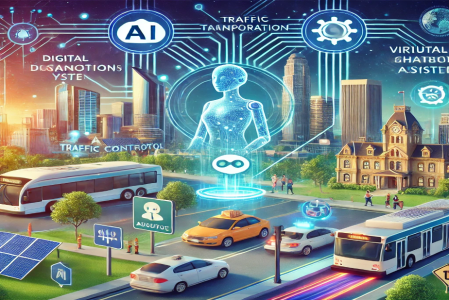Widgetized Section
Go to Admin » Appearance » Widgets » and move Gabfire Widget: Social into that MastheadOverlay zone
Smart Governance: The Role of AI in Public Service Innovation
The views expressed are those of the author and do not necessarily reflect the views of ASPA as an organization.
By Biswanath Bhattacharjee
April 7, 2025

AI can significantly enhance various sectors within public service delivery:
- Healthcare: AI-powered diagnostic tools analyze medical images and patient records, enabling early disease detection. Predictive analytics assist in resource allocation during public health emergencies. For instance, AI played a crucial role in forecasting COVID-19 outbreaks and optimizing vaccine distribution.
- Education: AI-driven adaptive learning platforms tailor curricula to individual student needs, improving learning outcomes. Automated grading systems reduce teachers’ workloads, allowing more time for instruction and mentorship.
- Transportation: AI optimizes traffic flow through real-time data analysis, reducing congestion and emissions. Predictive maintenance ensures the reliability of public transport infrastructure, while autonomous vehicles promise to revolutionize urban mobility.
- Public Administration: AI-powered chatbots handle citizen inquiries, reducing wait times and enhancing service efficiency. Automating routine tasks such as processing permits and tax filings allows human workers to focus on complex policy issues. AI also improves fraud detection, identifying irregularities in financial transactions and public benefits distribution.
- Public Safety: AI enhances predictive policing by analyzing crime patterns and identifying high-risk areas. During disasters, AI optimizes emergency response by predicting affected zones and efficiently allocating resources. AI-driven surveillance systems improve security while minimizing human errors.
- Environmental Management: AI helps model climate change scenarios, optimize waste management, and improve energy efficiency. For example, smart grids powered by AI balance energy supply and demand, reducing carbon footprints.
Benefits of AI in Public Services
Integrating AI into public services provides several advantages:
- Increased Efficiency: AI automates repetitive processes, reducing administrative burdens and minimizing delays.
- Enhanced Accuracy: AI systems analyze vast datasets with precision, reducing human errors in decision-making.
- Cost Savings: Automation optimizes resource allocation, lowering operational expenses.
- Improved Accessibility: AI-driven tools provide 24/7 support, ensuring citizens receive timely assistance regardless of location.
- Data-Driven Decision-Making: AI enables evidence-based policymaking, helping governments design targeted interventions for social challenges.
Ethical Considerations and Challenges
Despite its potential, AI implementation in public services raises several ethical concerns:
- Data Privacy and Security: AI relies on vast amounts of sensitive data, necessitating stringent protection measures to prevent breaches and misuse.
- Algorithmic Bias: AI models can reflect societal biases, leading to discriminatory outcomes. Ensuring diversity in training data is essential to mitigate bias.
- Transparency and Accountability: AI decision-making processes must be explainable, with mechanisms for human oversight and recourse for affected individuals.
- Job Displacement: Automation may replace certain roles, requiring investment in workforce reskilling and adaptation programs.
- Digital Divide: Unequal access to digital infrastructure can exclude marginalized populations from benefiting fully from AI-driven services. Governments must address disparities in internet access and digital literacy.
Case Studies of AI in Public Services
Several countries have successfully integrated AI into their public service frameworks:
- Estonia: A global leader in e-governance, Estonia leverages AI to streamline administrative tasks, from tax filings to digital healthcare records.
- Singapore: Under its Smart Nation initiative, Singapore employs AI in urban planning, transportation and public safety, enhancing citizens’ quality of life.
- United States: AI is being integrated into predictive policing, healthcare diagnostics, and automated customer service solutions in government agencies, demonstrating its broad applicability.
Prospects of AI in Public Services
The future of AI in public services is promising, with advancements in generative AI and quantum computing expected to enhance capabilities further. Public-private partnerships will play a crucial role in scaling AI solutions, combining government resources with private-sector innovation. However, ethical considerations must remain a priority to ensure AI benefits all citizens equitably.
Conclusion
AI holds immense potential to transform public service delivery by improving efficiency, accessibility and accuracy. However, its implementation must be guided by ethical principles, transparency and inclusivity. Governments must address challenges related to data privacy, bias, and job displacement to maximize AI’s societal benefits. By fostering research, collaboration and responsible governance, policymakers can harness AI’s capabilities to create more equitable, efficient and effective public services. As AI technology evolves, it will be crucial to ensure that its integration serves the greater good, reinforcing public trust and social progress.
Author: Biswanath Bhattacharjee is a dynamic public administration professional and legal educator with over 20 years of experience spanning academia, legal practice, research, and the nonprofit sector. Holding an MPA from Gannon University, he specializes in Management Science and Quantitative Methods. His interdisciplinary expertise drives innovative solutions in governance, policy analysis, and organizational leadership. He can be reached out at [email protected]


Muhammad Sifat Hossain
April 8, 2025 at 7:54 pm
That’s wonderful idea!
MUHAMMAD SEFAT HOSSAIN
April 7, 2025 at 9:00 pm
Wonderful analyzation…
AKM Masud
April 7, 2025 at 4:12 pm
This is a well-crafted and timely article with significant relevance and potential impact not only in the USA but also internationally.